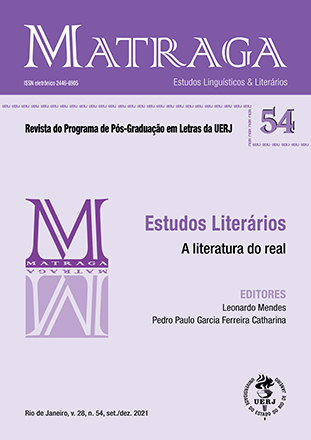Narrativas de um real em ruínas: dois momentos da literatura portuguesa pós-25 de abril
DOI:
https://doi.org/10.12957/matraga.2021.58843Palavras-chave:
Literatura Portuguesa Contemporânea, Guerra Colonial, Retornados.Resumo
Diversos críticos têm apontado para uma espécie de recuperação do realismo na narrativa portuguesa contemporânea, especialmente naquela produzida após o fim do Estado Novo e a consequente descolonização dos territórios africanos. Se o período entre as décadas de 30 e 70 do século XX foi marcado por silenciamentos e censura, após a Revolução dos Cravos, em 1974, vemos o surgimento de vários romances que trazem principalmente o tema da Guerra Colonial como foco. Por outro lado, alguns desdobramentos desse contexto, como a condição dos retornados na sociedade portuguesa, parecem surgir somente em um momento posterior, sobretudo a partir da década de 90, e vem ganhando novo fôlego no século XXI. Nesse sentido, este artigo propõe-se a realizar uma análise do que identificamos como dois momentos de abordagem do real na literatura portuguesa contemporânea: o primeiro, voltado para os anos imediatamente após a Revolução dos Cravos e observando um foco maior no cenário da Guerra Colonial, a partir das obras Os Cus de Judas (1979), Autópsia de um mar de ruínas (1984), A Costa dos Murmúrios (1988) e Jornada de África (1989); e o segundo recorte a partir do final do século XX e até o início da segunda década do século XXI, com as obras O esplendor de Portugal (1997), Caderno de memórias coloniais (2009) e O retorno (2012), que já trazem uma atenção especial à situação dos retornados. Em comum, os dois momentos acabam por identificar uma realidade de ruína, especialmente do imaginário criado pelos discursos do Estado Novo.
Downloads
Downloads
Publicado
Como Citar
Edição
Seção
Licença
AUTORIZAÇÃO
A Matraga – Revista do Programa de Pós-Graduação em Letras da UERJ está autorizada a publicar o artigo ora submetido, caso seja aceito para publicação online. Fica atestado que a contribuição é original, que não está sendo submetida a outro editor para publicação, e que a presente declaração é a expressão da verdade.
Os trabalhos publicados no espaço virtual da Matraga – Revista do Programa de Pós-Graduação em Letras da UERJ serão automaticamente cedidos, ficando os seus direitos autorais reservados à Matraga. Sua reprodução, total ou parcial, é condicionada à citação dos autores e dos dados da publicação.

A Matraga utiliza uma Licença Creative Commons - Atribuição-NãoComercial 4.0 Internacional.





